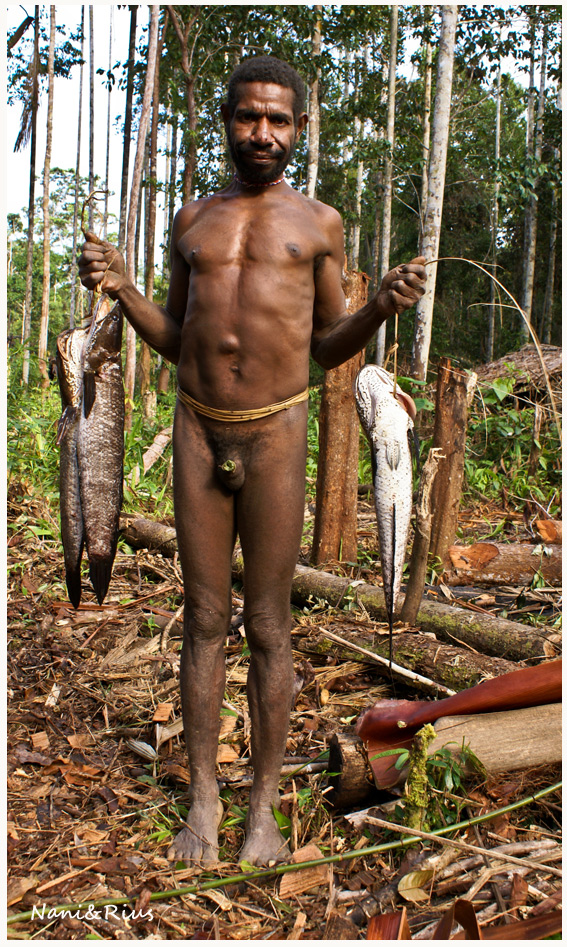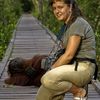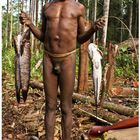Delicatessen Korowai II
Indonesia, Irian Jaya (Papua), Korowai Area (Southeast)
The image you show is a head that just Korowai just hunting with bow and arrow this marsupial (couscous is called there) for our lunch. I seemed to be eating rabbit.
Also today I leave you with an extremely interesting interview with a renowned anthropologist and explorer, PAUL RAFFAELE on their experience with the Korowai. I hope so you have more idea of what I have lived with these people so special.
Print sleep between cannibals "
The life of Australian anthropologist Paul Raffaele, 63 years seems an adventure film written by a demented screenwriter: endless walks through rainforests where it rots your clothes and skin becomes infected, wanderings in remote corners, withstand drops and indigestion; guns that point to the head ... But nothing comparable to the experience of living with the Korowai cannibals in Papua New Guinea. Angela Posada-Swafford
Since their first contact with indigenous unknown before-Burma-Myanmar and Laos, the efforts of Paul Raffaele, who started his career as a correspondent for U.S. television network ABC in Beijing 30 years ago, has been the tribes to get more remote parts of the globe to write about them before they were swallowed civilization. Somewhere along the way, this was mixed with the desire to study closely the wild animals, his other passion, and since then the errant writer divides his trips between the two objectives. Raffaele developed a well-written blend of history, politics, anthropology and adventure, and his stories appear in the best journals and scientific nature. In his expeditions had wandered through the jungle to hunt Venezuelan Anacon das, has learned to make with curare of the Amazon Indians, has sought the Ark of the Covenant in Ethiopia and has seen the most violent form of the game of polo in Pakistan. But his most memorable feat was sleeping among the Korowai tribe of cannibals in New Guinea.
From his home in Sydney, Raffaele confesses that he is "attacked". The next day goes to the Congo, escorted by peacekeeping forces of the United Nations, the only way to preserve life, to spend a few days with the mountain gorillas. Then fly to India to do a story about a tribe of cannibals who live on the banks of the Ganges, but has yet to be vaccinated against a host of diseases and unpronounceable names to repair a denture that brings you a headache.
- How will this toothache?
-Best, but I hope to cure it altogether. I do not want to suffer when in Rwanda against a gorilla.
-It will not be as fearsome as Korowai cannibals, which you lived. Who are they and how far?
-The Korowai tribe of New Guinea is one of the few that still practice cannibalism. The approximately 4,000 individuals are living in groups of 10 or 12 people in homes built in the treetops in the jungle. Do not know which is electricity, no cars, no roads, no violins, no penicillin, or Cervantes, or running water, or almost anything we can imagine. A foreign call Lale - "demons ghosts" - although most would not even ever seen a white person. Among them are scrambling often kill and eat and whom they consider khakhua or witches who take the form of men and are responsible for the mysterious deaths of members of the tribe. To get there I had to walk for several days and sail on a jungle is flooded. My guide, Kornelius Kembaren, brings 13 years traveling the territory back but never had both the river, because the Korowai threaten to kill those who are entering their children home. Kembaren had to deploy all his diplomacy to accept our visit.
- What was the first meeting with the leader cannibal?
-One night we went up to his tree house, which was quite extensive. We used fish from a river, and the head, Boas, using Kembaren as a translator, told me that khakhuas presented at night disguised as relatives or friends of his future victims to devour the bowels during sleep and fill them with fire, before you finish shooting a dart in the heart. According to Boas, the normal rule is that the dying person before death khakhua the name of his murderer, which might be an inhabitant of his tree house or a new one. "Therefore," Boas insisted, "we end up with khakhuas. Are harmful. " Then he was looking at me mischievously and said, "we do not eat humans. Only khakhuas.
- And how does the tribe to identify khakhuas between his own clan?
-Here is the question. It's very subjective because it identifies who the dying. I think the stomach burning sensation is nothing more than cramping caused by parasites. But be that as it may, the patient has the power to accuse someone, that is, to condemn it to death.
"From every human being eat ... except the bones, nails and penis "
- During dinner, she felt safe?
I was calm because I seemed to Boas a "reasonable", which appeared to Kilikili, the most notable clan murderer, according to my interpreter, inexpressive look of a guy whose mouth was drawing a face that put me hair-raising. Suddenly removed from the skull of a bag Bunop, his latest victim, who had killed and brain removed with stone ax which was hung to the belt. Kembaren's eyes moistened as I was commenting Bunop was shocked that one of his usual carriers. Then I spent the skull. I did not want to pick it up but not intended to offend the Korowai, so I held my hands and I froze the blood to feel the contact with the bone. No Western was never in that situation. Told me that Bunop deserved to die because he was a khakhua he had killed the cousin of one of the members of the clan: "So we tied it, the river took it up and riddled with arrows. Then, while singing entonábamos our rituals, we took the intestines, it will open the ribs and cut his arms and legs. " After the pieces of meat distributed among the members of the clan. The head is made that it had identified khakhua. Cooked human flesh by the same procedure as that of pork wrapped in banana leaves in a pile of stones that were hot oven.
- Do you eat it played?
Fortunately, not because the killing took place a few days before, but I asked what he knew human flesh, if you looked at the pig. One of them denied the head and told me he knew a cassowary, a bird typical of New Guinea. He also told me that the meals are not involved khakhua children and that men and women present eat everything except the bones, nails and penis. "I like everything," said Kilikili, "but the brain is my favorite snack," and others nodded in silence.
- And that night was able to sleep?
-Little. I was impressed and fascinated but scared thinking he was going to sleep between cannibals. Pa ra height, the next day appeared a muscular type armed with bow and arrows and sat in the middle of the group, avoiding my my rada; go, however, during the ma Nana I noticed while I was talking to Boas on climate and crops Diaba he studied carefully. Kembaren then told me that it was Lepeadon the Abul-khenmengga or "wild man" of the clan. An hour later he sat next to me, very seriously, and said: "I thought you were a ghost, but now I see that is a human like us." Was going to answer a child when I jumped up and tried to take off your pants in the midst of general laughter. Korowai for clothing is somewhat absurd.
- Is there a trick to make you accept?
-Mine is to make laugh. On one occasion I made a memorable trip to Brazil in Sydney Possuelo, a director of the government of that country that deals with more isolated Amazon tribes. Sydney is an incredible person who has established friendly contacts with seven tribes who had never seen a foreign ro, and has earned their respect. It is the last of the great explorers. Well, once took me to visit korubo, a very isolated group living in a remote area which is reached after an arduous journey across hundreds of kilometers of jungles and rivers. As we approach the Maloca, a shack that serves as a communal meeting point of the entire clan, warned me that Sydney should be alert because korubo, also known as aplastacabezas were, as I said, people unpredictable and sometimes very violent had killed three white men recently transferred its territory. Even he had attacked on occasion. The fact is that after a few hours left me alone with a group of children and young people who looked shocked me and I came to dance the dance haka, the Maori of New Zealand Warriors, which is accompanied by an exaggerated gestures, opening the eyes grotesquely , tongue and giving blows to the chest. The children laughed with laughter.
Lepeadon with members of his clan in the housing community comparten.Después left the adults in the Sydney Maloca and asked me to repeat the dance, this time I was dared do more and got off the pants, like the Maori, and I enjoyed it even more because they had never seen a butt so white. In the end, one of the warriors korubo approached me and told me: "You're a nowa, a white man. Nowa Some are good, but most are bad. " I watched anxiously, waiting to tell me that I was good. The warrior grabbed a handful of wild strawberries, crush me with his hand and daubed his face with the juice. After more juice mixed with the powder of a root and it gave me drink. I did not dare to refuse and I took it, crossing his fingers that was not poison, it was next to another container where just to prepare curare arrows. I thought I was going to have a narcotic effect, such as kava from the Polynesian islands, but only I knew how to mud. The warrior looked at me smiling and copied one of the Maori gestures that I had done before. I think that meant that I accepted.
"I got to drink a potion ... fingers crossed for it not being curare, the poison arrows that permeate "
- Do you bring gifts to the Indians?
No, do not usually take anything or bring me memories of their villages, except a stone ax Korowai I bought once.
- Are these tribes in imminent danger of extinction?
Without doubt. Is a consequence of globalization. Sydney told me bitterly that the Church and the loggers were their greatest enemies. The Church remains committed Christian, destroying their traditional ways of life, and the loggers want to cut down their forests and woodlands. He feels involved in their protection and I fear for his life because Sydney has many enemies among people who want to develop the Amazon at all costs. The fact is that Western culture seduces the young and the elderly. Who can resist the television, cars, guns, food variety? The transition is rapid. As discovered television, whole clans come together to buy equipment for the entire tribe, and there are introduced values alien to their culture and traditional lost theirs.
Children no longer learn the oral history of their ancestors, a complex network of their mythologies and their way of understanding the world, all of this wonderful culture to be passed to future generations. But now go to schools where there is television and it's like personality changes. Sydney Possuelo not take pictures of them elsewhere or pictures and taught his camera. He says there are still tribes in the Valley Javari have never had contact with anyone outside his world and know their names and languages, but prefers to leave them as they are: happy, hunting and fishing, with the sole vision of their own world.
- And you think that is fair and logical?
That is a question to many people. Would you do a favor by keeping them isolated Amazonian peoples and bottled as a anthropological curiosity? Is ignorance an asset or should the government of Brazil to open the doors of the twenty-first century and bring health care, technology and education? I think the inevitable fate of all these tribes is in contact with the world.
- Is it true that everything has happened in your travels?
Yes, it is inevitable in the areas I usually do. I have suffered falls, infections, strains, sprains, I have broken my skull and I have all sorts of vermin stung. On one occasion my stomach swelled like a balloon and I had dreadful pain because of an infection, but I can say that I am very lucky because for some reason I am immune to malaria, which is worst of all.
- Is it true that you can not drive?
It's true. When I was young I liked so much speed that I decided not to drive because they never knew that he would kill me if I'm driving a car. I had to invent tricks to protect myself from my desire to run extreme risks. The best protection is fear. Never has prevented me doing things, but at least it has made me more cautious.
"I do not know what it is electricity, no cars, no roads, no penicillin, no running water"
- What is your next project work?
Tomorrow, I go to Congo to study mountain gorillas. Only 700 copies in the wild world, and nearly all are there, not far from the group who studied at the time Dian Fossey. On the way back through India to work on a book on cannibalism in the river Ganges. Then I go to Mexico, along with the same subject, to investigate the Aztecs, who were great anthropophagi. Then go to Africa to work on a study of lions, and finally to New Guinea to attend the festival, a tribe whose members consume the brains of their dead relatives and are apparently victims of a disease as a result.
- Are you going to live with the cannibals?
"I love their culture and customs, but life with them is not easy and I do not think it could take several months there, armed with bows and arrows, not yet possible ambush of another clan. Imagine having to go armed to protect permanently the risk that you will kill and eat you every time you leave the house. But the Korowai are accustomed. This is normal in your life, such as crossing the street in a big city or to buy the newspaper in the kiosk is for us.










hrishikesh thakur 14/09/2009 4:55
excellent !